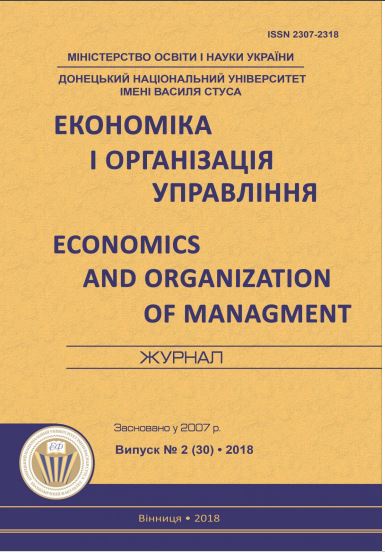Formation of the cluster model of national economy on the basis of regional development.
DOI:
https://doi.org/10.31558/2307-2318.2018.2.6Keywords:
кластери, процеси кластеризації, кластерна теорія, кластерні моделі національних економікAbstract
The article deals with the fundamental directions of the theory of regional economics and regional management, which became the basis for the development of cluster theory. Author's definition of the cluster model of development of the national economy is provided, requirements for effective state regional policy are substantiated. The scheme of forming a cluster model of the national economy, which determines the effective course of development of cluster models of the national economy, is presented. It is proved that the formation of clusters by integrating regions and consolidating the branches will accelerate the process of introducing new organizational forms of integration and cooperation of business entities that carry out various types of economic activity. It has been determined that activation of integration processes will contribute to the growth of innovation activity and the expansion of export potential, which will ultimately increase the competitiveness of the national economy. A number of strategic tasks, which the state and the scientific community should solve on the way of building an effective cluster model of the national economy, are formulated.References
Кластерні об'єднання: міжнародний досвід та українські реалії / М. Войнаренко, А. Береза // Економіст. - 2013. - № 10. - С. 27-30
Пилипенко И. В. Принципиальные различия в концепции промышленных кластеров и территориально-производственных комплексов. // Вестник Московского Университета. Серия 5. География. – 2004, №5. – С. 3-9.
Мельников Р. М. Проблемы теории и практики государственного регулирования экономического развития регионов: Монография. – М.: Изд-во РАГС, 2006. – 209 с.
Глух Н. А. Институционально-социологическая традиция во Франции. Ф. Перру История экономических учений: (современный этап). Под ред. А. Г. Худокормова. М.: Инфра-М. 1998. – 733 c.
Кастельс М. Информационная эпоха: экономика, общество, культура. http://www.gumer.info/bibliotek_Buks/Polit/kastel/03.php
Корчагина, Н. А. Кластерная политика – технология повышения эффективности управления компаниями [Текст] : монография / Н. А. Корчагина. –Астрахань : Издательский дом «Астраханский университет», 2009. – 117 с.
Портер Майкл Конкуренция: Пер. с англ. — М.: Издательский дом "Вильямс", 2005. — 608 с.
Smorodinskaja N. (2013) “Regional Innovation Clusters: Global Guidelines and Russian Realities”, [Online], available at:http://regconf.hse.ru/uploads/ede481990d3d34e296401e66fdf53518aa7e6ce6.pdf
Synopsis of Policy Options for Creating a Supportive Environment for Innovative Development. ECE/CECI/2008/3, Geneva, 9 September 2008
Гулак Д.В. Розвиток електроенергетичного ринку України на засадах регіональної кластеризації: монографія. Черкаси: видавець Пономаренко Р.В., 2018. – 286 с.
Оскольський В. Кластеризація – вагомий фактор підвищення конкурентоспроможності економіки України. Економіка України. 2014. № 11. С. 4–16.
Solvell O., Lindqvist G., Ketels Ch. The Cluster Initiative Greenbook. The Competitiveness Institute / VINNOVA, Gothenburg, 2003.

